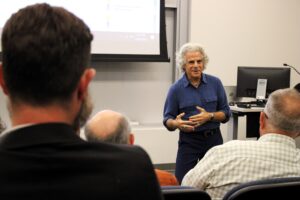Collaboration Will Take Us Where Competition Can’t
Collaboration Will Take Us Where Competition Can’t
 At the heart of OnTrackNorthAmerica’s work is the advancement of collaboration and coordination as a superior orientation for government and business. But before establishing my own confidence in people’s ability to collaborate and work in the community’s best interests, I had to ponder, as many of us do, “Are people inherently altruistic, or are they self-centered?”
At the heart of OnTrackNorthAmerica’s work is the advancement of collaboration and coordination as a superior orientation for government and business. But before establishing my own confidence in people’s ability to collaborate and work in the community’s best interests, I had to ponder, as many of us do, “Are people inherently altruistic, or are they self-centered?”
Particularly in America, we have been taught that striving for individual success is best for everyone because, according to the authority on the subject, Charles Darwin, evolution depends on it. “Survival of the Fittest,” implying that humans, like other species, are naturally selfish and that selfishness drives progress, was given its scientific basis. But is it possible that this belief exerts an undue and debilitating influence on society?
It occurred to me to read On the Origin of Species to see what Darwin actually said, not what I had been told he said. What I found was that Charles Darwin didn’t use the phrase “Survival of the Fittest.” Contrary to prevailing belief, he wasn’t highlighting individual competition. He wrote that in nature, the community provides the best perches, food, and resources to those amongst them that are strongest and, therefore, will produce the healthiest offspring. Harmony within the community, not domination of the community, is what he observed. Charles Darwin wrote that individuals in nature are inherently social, and that is what produces well-being for the community.
So, how did we come to misapply Darwin’s transformative work? Why did we orient commerce and governance around competition and mistrust rather than cooperation and trust? What would have us think that we must pit individuals, companies, organizations, political parties, and countries in an endless competition?
We recall that “Darwinism” gained popularity during the mid-19th century, when American and British industrialists sought a belief system to justify their massive accumulation of wealth and power. They sponsored members of a new intellectual field called Social Philosophy to promote a misreading of On the Origin of Species. One of the movement’s leading figures, Herbert Spencer, originated the term “Survival of the Fittest.” Because the public’s access to Darwin’s book was limited, those in power used this misinformation campaign to influence public support for their versions of “Capitalism” and “Democracy.”
We’re all suffering under the influence of Spencer’s false and destructive misinterpretation of nature and, indeed, humanity. Governance and commerce have since developed around an over-reliance on competitive debate, competing factions, and constant jockeying for attention and favors. Competition stifles our collective potential. It is highly inefficient for towns, counties, states, countries, and their businesses to compete with each other. The wisest placement of all components of a sustainable industrial system is only possible through collaboration and coordination.
Of course, competition has its place in sports, games, and some aspects of business. However, orienting our civilization’s primary functions around competition is outmoded and unsustainable. There’s a better way.
As we face environmental stresses and extreme violence that threaten our peace and prosperity, it is more crucial than ever to discard outdated and limiting assumptions and embrace the reality of humanity’s inherent commitment to our community. Let’s redesign our industrial systems for sustainability and our governance systems for workability.
OnTrackNorthAmerica convenes stakeholders in productive dialogue using our question-based dialogue method, IntelliSynthesis®. Questions are inherently interactive, opening our minds to intelligent thought exploration and shared knowledge. By then synthesizing, cataloguing, and utilizing this collective intelligence, diverse stakeholders can solve problems and implement action plans effectively.
Our work is informed by close interactions with over 11,000 individuals across the continent who have overwhelmingly expressed their heartfelt desire for a world that works for everyone. As Darwin discovered 175 years ago, society advances when people strike a balance between useful competition and essential collaboration.

